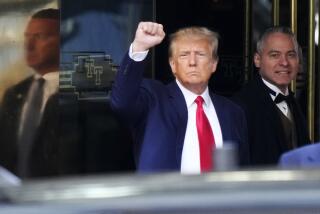U.S. Authorities Face Obstacles in Investigation of Farrakhan
- Share via
WASHINGTON — In the view of some outraged lawmakers, he thumbed his nose at the United States by consorting with some of the nation’s worst enemies, joined in their condemnation of Americans and accepted pledges of support from Libyan strongman Moammar Kadafi.
Yet it seems that any Justice Department prosecution of Nation of Islam leader Louis Farrakhan would face nearly insurmountable difficulties in proving that he had violated federal laws, such as his failure to register as a foreign agent of Libya after he conferred with Kadafi.
Justice Department officials said that the thrust of the criminal provisions of that law is to crack down on those who willfully seek to hide their involvement with a foreign power and that there was nothing secret about Farrakhan’s recent tour abroad.
As to other laws, the Treasury Department is questioning whether the controversial minister also violated a 10-year-old ban on financial transactions with Libya, which President Reagan issued. However, some government sources noted, no evidence has emerged that any money has yet been paid to Farrakhan or that he spent his own money in Libya.
Farrakhan’s lawyers, in a letter received by the Justice Department this week, reiterated the intention of the black Muslim minister to accept more than $1 billion pledged by Kadafi when Farrakhan visited the Libyan leader last month. But until Farrakhan actually receives the money, there could be insufficient evidence that he had violated the law. And even if he does receive the money, it could be difficult to prove that it came from Libya.
The minister’s lawyers argued that because the money would be a gift, Farrakhan would not be required to register as a foreign agent.
U.S. officials noted that Farrakhan’s statement that he would accept more than $1 billion from Kadafi does not establish that he had violated the ban on financial transactions with Libya, which Reagan issued under the International Emergency Economic Powers Act.
That prohibition also covers “transportation-related transactions involving Libya by U.S. persons,” but authorities would have to prove that Farrakhan spent his own money there for his traveling. With Farrakhan’s lawyers insisting that he has violated no law, this could require examining hotel and transportation records in Libya, a federal investigative source noted.
And, contrasted with the 23 prosecutions that have been conducted since the law took effect nearly 10 years ago, a crackdown on a controversial figure for outlawed travel-related expenditures would seem out of proportion, some officials said. Those cases ranged from a $1.3-million scheme to export sonar gear to the Soviet Union to a plot to send agricultural equipment to Libya.
More to Read
Sign up for Essential California
The most important California stories and recommendations in your inbox every morning.
You may occasionally receive promotional content from the Los Angeles Times.













